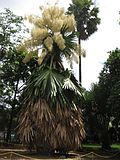Talipot palm
Corypha umbraculifera, the talipot palm, is a species of palm native to eastern and southern India and Sri Lanka. It is also in Cambodia, Myanmar (Burma), Thailand and the Andaman Islands.[2]
| Talipot palm | |
|---|---|

| |
| Talipot palm flowering at Kerala, India | |
| Conservation status | |
| Scientific classification | |
| Kingdom: | Plantae |
| Order: | Arecales |
| Family: | Arecaceae |
| Genus: | Corypha |
| Species: | C. umbraculifera
|
| Binomial name | |
| Corypha umbraculifera | |
| Synonyms[1] | |
| |
It is one of the largest palms in the world. Individuals have reached up to 25 m (82 ft) with stems up to 1.3 m (4.25 ft) in diameter.[3] It is a fan palm (Arecaceae tribe Corypheae), with large leaves up to 5 m (16 ft) in diameter, with a leaf stem up to 4 m (13 ft), and up to 130 leaflets.
The talipot palm bears the largest inflorescence of any plant, 6-8 m (20-26 ft) long, consisting of one to several million small flowers borne on a branched stalk at the top of the trunk.[4] The talipot palm flowers only once,[5] when it is 30 to 80 years old. It takes about a year for the fruit to mature, producing thousands of round, yellow-green fruit 3-4 cm (1.2-1.6 in) in diameter, each containing a single seed. The plant dies after fruiting.[6][7]
Talipot Palm Media
Kep, Cambodia
At Lyon Arboretum, Hawaii, U.S.
At Jardin Botanique de Deshaies, Guadeloupe
References
- ↑ "The Plant List Corypha umbraculifera". Archived from the original on 2018-10-04. Retrieved 2018-10-10.
- ↑ Kew World Checklist of Selected Plant Families, Corypha umbraculifera[dead link]
- ↑ "Dominica Botanic Gardens". Archived from the original on 2007-02-18. Retrieved 2015-04-25.
- ↑ the titan arum, Amorphophallus titanum, from the family Araceae, has the largest unbranched inflorescence, and the species Rafflesia arnoldii has the world's largest single flower.
- ↑ is 'monocarpic'
- ↑ Rafinesque, Constantine Samuel. 1938. Sylva Telluriana. Mantis Synopt. New genera and species of trees and shrubs of North America p 13, Bessia sanguinolenta
- ↑ Linnaeus, Carl von. 1753. Species Plantarum 2: 1187, Corypha umbraculifera

